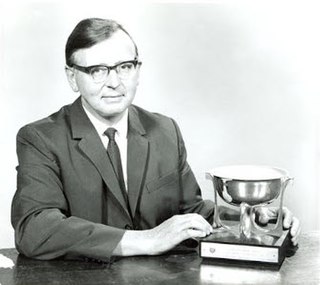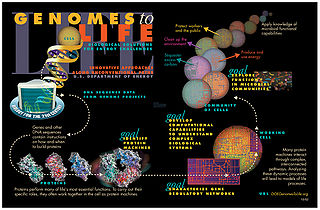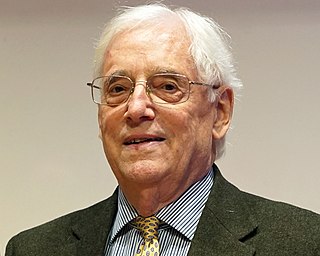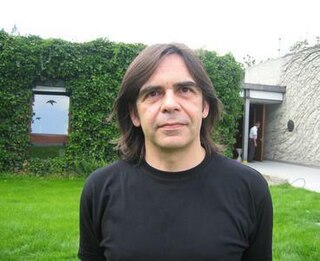Related Research Articles
Computational neuroscience is a branch of neuroscience which employs mathematical models, theoretical analysis and abstractions of the brain to understand the principles that govern the development, structure, physiology and cognitive abilities of the nervous system.

James Hardy Wilkinson FRS was a prominent figure in the field of numerical analysis, a field at the boundary of applied mathematics and computer science particularly useful to physics and engineering.

Systems biology is the computational and mathematical analysis and modeling of complex biological systems. It is a biology-based interdisciplinary field of study that focuses on complex interactions within biological systems, using a holistic approach to biological research.

Eugene Viktorovich Koonin is a Russian-American biologist and Senior Investigator at the National Center for Biotechnology Information (NCBI). He is a recognised expert in the field of evolutionary and computational biology.
Mathematical and theoretical biology is a branch of biology which employs theoretical analysis, mathematical models and abstractions of the living organisms to investigate the principles that govern the structure, development and behavior of the systems, as opposed to experimental biology which deals with the conduction of experiments to prove and validate the scientific theories. The field is sometimes called mathematical biology or biomathematics to stress the mathematical side, or theoretical biology to stress the biological side. Theoretical biology focuses more on the development of theoretical principles for biology while mathematical biology focuses on the use of mathematical tools to study biological systems, even though the two terms are sometimes interchanged.
Jonathan Michael Borwein was a Scottish mathematician who held an appointment as Laureate Professor of mathematics at the University of Newcastle, Australia. He was a close associate of David H. Bailey, and they have been prominent public advocates of experimental mathematics.
Computational science, also known as scientific computing or scientific computation (SC), is a rapidly growing multidisciplinary field that uses advanced computing capabilities to understand and solve complex problems. It is an area of science which spans many disciplines, but at its core it involves the development of models and simulations to understand natural systems.

Sir John Ernest Walker is a British chemist who won the Nobel Prize in Chemistry in 1997. As of 2015 Walker is Emeritus Director and Professor at the MRC Mitochondrial Biology Unit in Cambridge, and a Fellow of Sidney Sussex College, Cambridge.

The Department of Computer Science is the computer science department of the University of Oxford, England, which is part of the university's Mathematical, Physical and Life Sciences Division. It was founded in 1957 as the Computing Laboratory. By 2014 the staff count was 52 members of academic staff and over 80 research staff. The 2015 QS World University Subject Rankings places Oxford 3rd in the world for Computer Science and 1st in Europe with Cambridge in 7th. Oxford is also the top university for computer science in the UK and Europe according to Business Insider and was ranked 2nd for Computer Science and Information Systems in the 2016 Guardian University league tables.

Sir David John Spiegelhalter is a British statistician and Winton Professor of the Public Understanding of Risk in the Statistical Laboratory at the University of Cambridge and a Fellow of Churchill College, Cambridge. Spiegelhalter is an ISI highly cited researcher.

Michael Levitt, is an American-British-Israeli-South African biophysicist and a professor of structural biology at Stanford University, a position he has held since 1987. Levitt received the 2013 Nobel Prize in Chemistry, together with Martin Karplus and Arieh Warshel, for "the development of multiscale models for complex chemical systems".

Dame Nancy Jane Rothwell is a British physiologist, President and Vice-Chancellor of the University of Manchester since July 2010, having been Deputy President and Deputy Vice-Chancellor since January 2010. Rothwell is also a director of pharmaceuticals company AstraZeneca, co-chair of the Council for Science and Technology and past President of the Royal Society of Biology. She is a Deputy Lieutenant of Greater Manchester
Nicholas John Higham FRS is a British numerical analyst. He is Royal Society Research Professor and Richardson Professor of Applied Mathematics in the School of Mathematics at the University of Manchester.
Physiomics is a systematic study of physiome in biology. Physiomics employs bioinformatics to construct networks of physiological features that are associated with genes, proteins and their networks. A few of the methods for determining individual relationships between the DNA sequence and physiological function include metabolic pathway engineering and RNAi analysis. The relationships derived from methods such as these are organized and processed computationally to form distinct networks. Computer models use these experimentally determined networks to develop further predictions of gene function.

Endre Süli is a mathematician. He is Professor of Numerical Analysis in the Mathematical Institute, University of Oxford, Fellow and Tutor in Mathematics at Worcester College, Oxford and Supernumerary Fellow of Linacre College, Oxford. He was educated at the University of Belgrade and, as a British Council Visiting Student, at the University of Reading and St Catherine's College, Oxford. His research is concerned with the mathematical analysis of numerical algorithms for nonlinear partial differential equations.
Dame Julia Mary Goodfellow is a former Vice-Chancellor of the University of Kent, and Chair of the British Science Association. She was the president of Universities UK from 1 August 2015 until July 2017.
Karl John Friston FRS, FMedSci, FRSB, is a British neuroscientist at University College London and an authority on brain imaging.
Robert Lee Grossman is an American computer scientist and bioinformatician at the University of Chicago. His primary research interests are data science and data-intensive computing.
Cell-based models are mathematical models that represent biological cells as a discrete entities. They are used in the field of computational biology for simulating the biomechanics of multicellular structures such as tissues. Their main advantage is the easy integration of cell level processes such as cell division, intracellular processes and single-cell variability within a cell population.

(Julia) Alison Noble is Technikos professor of Biomedical Engineering at the University of Oxford, a Fellow of St Hilda's College, Oxford and Associate Head of the Mathematical, Physical and Life Sciences Division at the university. As of 2017 she is chief technology officer(CTO) of Intelligent Ultrasound Limited an Oxford University spin-off in medical imaging which she cofounded. She was director of the Oxford Institute of Biomedical Engineering (IBME) from 2012 to 2016.
References
- ↑ "Integrative Biology: Project Board". Archived from the original on 2007-04-29.
- ↑ "New College: Fellows". Archived from the original on September 26, 2006.
- ↑ David Gavaghan publications indexed by Google Scholar
- ↑ Smallbone, Kieran; Gavaghan, David J.; Gatenby, Robert A.; Maini, Philip K. (2005). "The role of acidity in solid tumour growth and invasion". Journal of Theoretical Biology. 235 (4): 476–484. doi:10.1016/j.jtbi.2005.02.001. ISSN 0022-5193. PMID 15935166.
- ↑ Jadad, Alejandro R.; Moore, R.Andrew; Carroll, Dawn; Jenkinson, Crispin; Reynolds, D.John M.; Gavaghan, David J.; McQuay, Henry J. (1996). "Assessing the quality of reports of randomized clinical trials: Is blinding necessary?". Controlled Clinical Trials. 17 (1): 1–12. doi:10.1016/0197-2456(95)00134-4. PMID 8721797.
- ↑ "Durham University gazette, 1985/86". reed.dur.ac.uk. Retrieved 6 May 2018.
- 1 2 "Professor David Gavaghan". Oxford: University of Oxford. Archived from the original on 2015-06-20.
- ↑ "SSI Advisory Board". software.ac.uk. Archived from the original on 2012-03-29.
| This article about a British scientist is a stub. You can help Wikipedia by expanding it. |